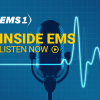Download this week’s episode on iTunes, SoundCloud or via RSS feed
In this week’s Inside EMS Podcast, co-hosts Chris Cebollero and Kelly Grayson consider whether the on-demand car service Uber could practically delivery medical care.
The idea is based on reports Uber drivers have faster response times than ambulances in New York and London. Cebollero and Grayson look at an article by EMS1 Editor-in-Chief Greg Friese that explores seven community health care services that Uber drivers could start delivering immediately.
“Is this just a tongue in cheek thing, or is this something Uber is going to wind up taking a stand on?” Cebollero asked.
Grayson said while it’s not something to seriously consider, it does point to the limitations of EMS to live up to the expectations and demands of patient care.
Crowdsourcing apps like PulsePoint, for instance, are already taking bystander responses to another level, and the idea of Uber drivers providing medical care speaks to the overarching concept of empowering lay people to render care, Grayson said.
Cebollero there’s also the question of money.
“It’s fun, it’s tongue in cheek, it opens up some interesting possibilities, but the funding source is going to be the big issue because nobody is going to be able to provide these bills,” Cebollero said.
In the news
In the news, Cebollero and Grayson discuss a lawsuit where a family is seeking up to $4.2 million, and says a man died because it took firefighters 14 minutes to get a defibrillator to deliver a shock.
Cebollero said if it indeed failed, the manufacturer should be on the hook as well. Grayson points out that AEDs do diagnostic self checks, and suspects there was a misunderstanding about the care delivered.
They also talk about an EMT who sued an ambulance company for not paying overtime. The suit claims more than 100 EMTs were affected and may provide an option for them to “opt-in.”
“It looks like there were some crazy policies going on there,” Cebollero said. “These are clear-cut violations of employment law.”
New ambulances in Missouri equipped with a chair containing a harness that allows providers to treat patients while being strapped in is a safety feature that’s long overdue, Grayson said.
He reminds listeners that the NHTSA is hosting a free webinar on ambulance crash data used to improve safety.












